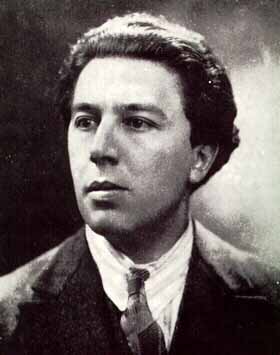André Breton (André Breton)

Poet, Author, Essayist, Founder of Surrealism. André Breton was born in the Normandy village of Tinchebray, the only child of shopkeepers. His mother wanted him to become a physician and he went to Paris to study medicine. While there his interests turned to art and literature. He served as a medic during World War I and cared for soldiers who had been gassed or shell shocked. Influenced by the writings of Sigmund Freud, he took special note of these soldiers’ psychological state and was impressed by the visions they described. Returning to Paris after the war, he abandoned medicine for literary pursuits and joined the Dada movement. He practiced automatic writing and, with fellow poet Philippe Soupault, wrote The Magnetic Fields. He married Simone Kahn, an art dealer. Noted poet Paul Valéry was best man at the wedding. Breton’s groundbreaking work, The Surrealist Manifesto, defined Surrealism as a literary and artistic movement, as well as a revolutionary way of living. His first novel, Nadja, brought him acclaim and is considered a modern masterpiece (in the late 1990s Yves Saint Laurent purchased the manuscript at auction for $684,000). His first marriage ended and he married artist Jacqueline Lamba, with whom he had his only child, a daughter named Aube. His happiness inspired the book Mad Love. He joined the Communist Party but became disillusioned and eventually resigned. At the beginning of World War II, Breton was declared a “dangerous anarchist” by the Vichy government and moved with his family New York City. The situation strained his marriage, and Jacqueline left him for sculptor David Hare. He then met and married the love of his life, Élisa Claro, and wrote Arcana 17 and several volumes of poetry. Breton gathered artists and writers into the Surrealist group, which included Pablo Picasso, Max Ernst, Marcel Duchamp, Yves Tanguy, Man Ray, Louis Aragon, Paul Éluard, and Salvador Dali. Referred to as “the Pope,” he was kind and supportive toward those who shared his views, but excommunicated those with whom he disagreed. In September 1966 he became ill at his country home in Saint-Cirq-Lapopie and died of respiratory failure after being transported to Paris. Breton’s revolutionary attitude made him a hero of French liberals and intellectuals, and hundreds of young people walked in his funeral procession. A statement made during the French student uprisings in May 1968 was “André Breton missed his party.” Breton struggled financially for most of his life, yet ironically in 2003 a widely contested auction of his collection of art, books, manuscripts and photographs brought a record $50.1 million. Epitaph on his tomb: “Je cherche l’or du temps” (I seek the gold of time), from The Surrealist Manifesto. (bio by: Tigress)
Born
- February, 19, 1896
Died
- September, 09, 1966
Cemetery
- Batignolles Cemetery
- France

